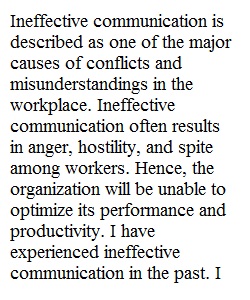


Q In this module, you have learned strategies for creating and sharing effective organizational communications. While knowing what to do and how to do it is helpful, sometimes understanding the repercussions of not doing something effectively can help you better understand the importance of doing it well. For your initial post, reflect on a time when you experienced ineffective communication at work or at school (for example, through an email exchange or an announcement from leadership, a business meeting, unclear directions for a project, or even a conversation with a peer). Use the following questions to guide your post: • Who was involved in the communication exchange? • What type of communication was it, based on definitions from your module resources? • What do you think made the communication ineffective? • What were the negative impacts of the ineffective communication, and who was impacted by it? In your response post to at least two peers, address the following: • Are there any other reasons the communications were ineffective? Were there any other negative impacts or people negatively impacted that your peers did not mention? If so, explain. • What communication strategies or approaches could have been used to avoid the ineffective communications? What negative impacts would these have helped avoid, and why? Use course resources to support your response.
View Related Questions